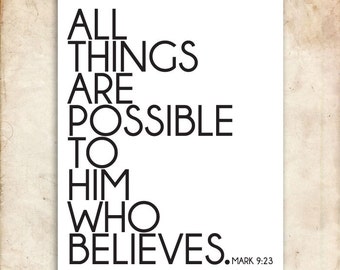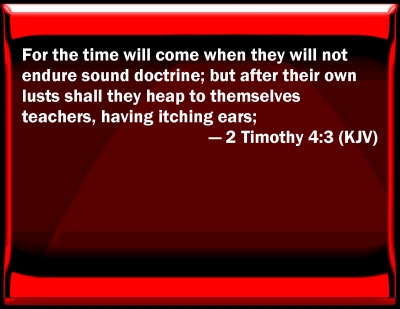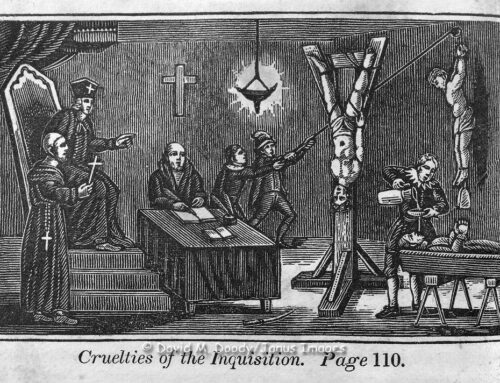“I dreamed that I walked down the street of a town-it could have been any town-and came to a church-it could have been almost any church. The congregation was singing “Onward, Christian Soldiers,” and if there had been one more verse they might have sung themselves to sleep. The text was, “All things are possible to him that believeth” (Mark 9:23). I said to myself, “If they really believe this, it will be interesting to see what happens after the benediction.” After the sermon they sang “Rescue the Perishing” and I could hardly wait to see them start rescuing the perishing. But nothing happened. Someone made a remark about the weather and when I asked “But when do you start rescuing the perishing?” He looked at me in alarm and hurried away. As I walked down the street there walked beside me One whom I did not recognize at first. I asked Him, “Do they always act like this at church?” Then I knew who He was when He said, sadly, “This people draweth nigh unto me with their mouth, and honoureth me with their lips; but their heart is far from me” (Matthew 15:8).”
~Vance Havner
“The television performer watches his ratings, the politician his votes, the public speaker his applause, but the prophet who speaks for God is not governed by such responses. He delivers his message though it may fall on deaf ears and gain him only scorn and maybe a prison cell. Amos did not rate with the big-wigs of Bethel, nor did John the Baptist win applause in the courts of Herod. The forerunner had crowds but he stepped aside and left the center of the stage to One greater than himself. We live in a day when men will not endure sound doctrine but look instead for pleasant ticklers of itching ears. Is there not somewhere a coming prophet who will forget comfort and security and status and retirement benefits for the loneliness of a Jeremiah, the perils of a Savonarola, the conflicts of a Luther, to speak for God in these last days? Barclay says that the settled ministry has always resented wandering prophets who disturb their congregations. So the wilderness voice is not welcome either at home or abroad. But his reward is in the approval of God and the verdict of history.”
~Vance Havner
THE SUPREME OBJECTIVE
By Vance Havner
When thou wast young, thou girdest thyself, and walkedst whither thou wouldest; but when thou shalt be old, thou shalt stretch forth thy hands, and another shall gird thee, and carry thee whither thou wouldest not.
John 21:18
Jesus is speaking to Peter, and the explanation follows: “This spake he signifying by what death he should glorify God.” What a picture, not only of impetuous, headstrong Peter but of us all in our early days when we did our own will and walked in our own way! We girded ourselves and walked where we wished and prided ourselves that we lived our own lives.
But the man who meets Jesus and submits to His sway comes to the day, blundering and stumbling as badly as Peter ever did, when he submits to what he does not choose for himself, even to death itself. And why? “This spake he signifying by what death he should glorify God.” Our sole business, whether by life or by death, is just that, to glorify God. And when we discover that and do it, we have arrived.
Paid in Full
By Rabbi Yechiel Eckstein
September 21, 2014
Blessed are those who have regard for the weak;
the LORD delivers them in times of trouble.— Psalm 41:1
A story is told about a young man who was walking in the woods one hot summer day. This was during the late 1800s so when he became overcome with fatigue, hunger, and thirst, help wasn’t so easy to find. The young man decided to knock on the first door that he saw. When he found a home, he resolved to ask for water, nothing more. A young girl opened the door but when the young man asked for water, she decided that he looked hungry and brought a large glass of milk instead. That milk gave the young man the energy he needed and bolstered his spirits so that he could make it home.
Years later, that little girl grew up and became very sick. She was sent to the city so that she could be treated by one of the nation’s top doctors. As she underwent surgery, Dr. Howard Kelly recognized the patient who he was treating — it was that little girl who had been so kind to him years ago. After the surgery, Dr. Kelly asked that all medical bills for the patient be sent to him for approval. As he looked them over, he scrawled something in black ink. When the woman recovered and was ready to leave the hospital, she was nervous to open the final bill. When she did, she was surprised to find this note from the doctor: “Paid in full with one glass of cold milk.”
In the opening line of Psalm 41, David wrote: “Blessed are those who have regard for the weak; the LORD delivers them in times of trouble.” Those who are kind to others in their time of need will find that help comes to them when they themselves are in need.
In Hebrew, the word “to give,” natan, is a palindrome. It reads the same way backward and forward in order to teach us that when we give, we also get back. May we always be motivated to give generously and live compassionately. We can save many lives with our charity, including our own.
With prayers for shalom, peace,
Rabbi Yechiel Eckstein
IF ANY MAN SIN
By Vance Havner
If any man sin…
I John 2:1
If we confess our sins…
I John 1:9
If we walk in the light…
I John 1:7
We should not sin, but if we do sin we have an Advocate with the Father. We have a prosecutor, and an accuser, the devil; but we also have a lawyer to plead our case, Jesus Christ the righteous.
If we confess our sins the Father will forgive and cleanse. There must be genuine repentance and confession, but we need not wallow in remorse. God is our Father, if we believe and we are His children. And like as a father pitieth his children, so the Lord pitieth them that fear Him.
“If we walk in the light as he is in the light, we have fellowship one with another; and the blood of Jesus Christ his Son cleanseth us from all sin.” Provision has been made for victory over sin. God’s plan is to keep us from sin, not to keep us in sin. There is no ground for complacent living in iniquity just because we are “under the blood.” “It is not that we are not able to sin but that we are able not to sin.” But He also has made provision if we do sin, forgiveness and cleansing if we confess.













Leave a Reply, please --- thank you.